Crossing the border for greater opportunities
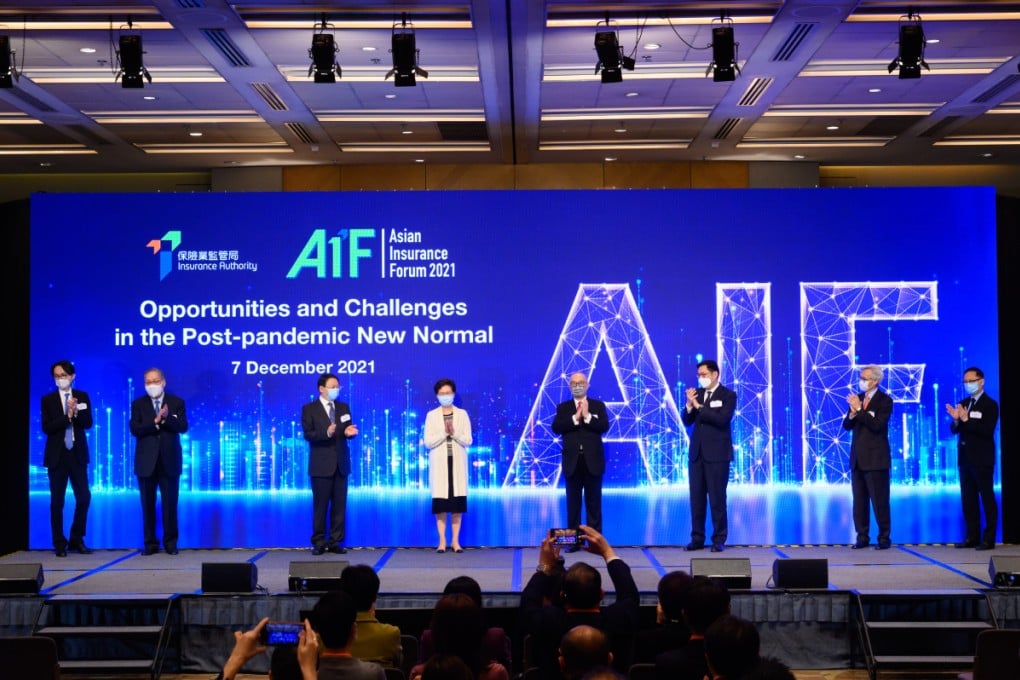
[Sponsored Article]
Hong Kong insurers are now eagerly awaiting the border re-opening with the mainland and keen to tap into the growing Greater Bay Area (GBA) market. And while COVID-19 has accelerated digital transformation, maintaining the “human touch” is equally important to an industry that is people-oriented and built on trust and integrity.
These are some of the discussion topics covered at the Asian Insurance Forum (AIF) 2021 organised by the Insurance Authority (IA) on December 7, which attended by over 1,000 online and onsite guests.
In his welcome remarks, Dr Moses Cheng, Chairman of the Insurance Authority (IA), highlighted how the pandemic has accelerated the insurance industry's digital transformation. Dr Cheng said that the new normal manifests in adopting remote onboarding systems, paperless transaction protocols, automated back-office processes, innovative product features, and robust business continuity plans, fortified risk assessment and internal controls.
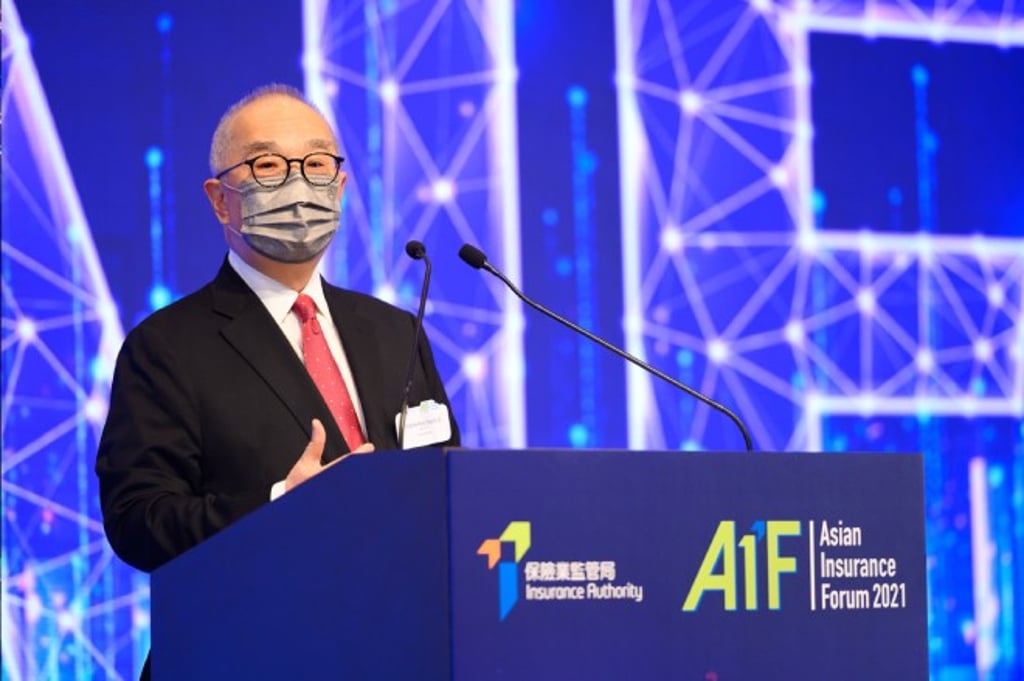
“Despite an external environment filled with doubts and uncertainties, it is indeed fortunate that under ‘One Country Two Systems’, we would be able to play a meaningful part in contributing towards national development while pursuing our own progress,” Dr Cheng added.
Carrie Lam, Hong Kong’s Chief Executive, emphasised in her opening address that the 14th Five-Year Plan has already positioned Hong Kong as an international financial centre and a global risk-management centre under the ‘dual-circulation’ economic strategy, presenting enormous opportunities for our insurance industry in the GBA.
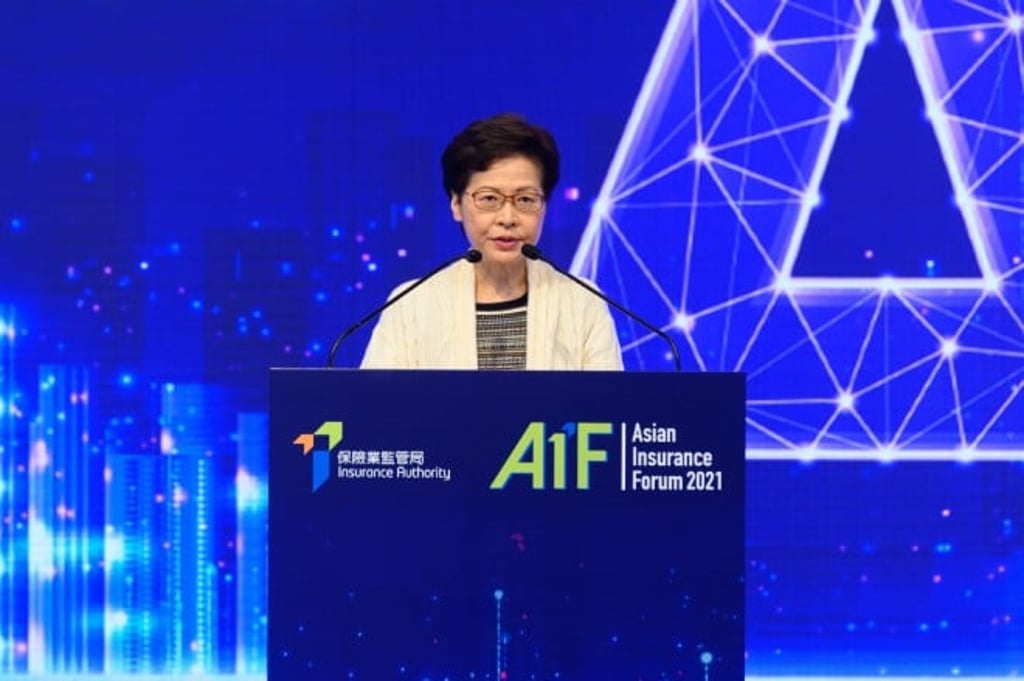
The insurance industry has an essential role in realising the vision of the GBA, noting that the Government has been working with the IA to facilitate the setting up of after-sales service centres in the GBA.
The Government is also preparing to introduce the unilateral recognition policy which will allow third-party insurance coverage for Hong Kong vehicles entering Guangdong Province via the Hong Kong-Zhuhai-Macao Bridge when the cross-boundary travel resumes. She added that there is also the possibility of developing cross-boundary health policies and other innovative insurance products.
In his keynote speech, Jonathan Dixon, Secretary General of the International Association of Insurance Supervisors, talked about the outcome of the Global Monitoring Exercise and the importance of supervisory coordination in addressing global issues such as climate change, digital transformation and cyber risks, and also touched on the strategic issues of diversity, equity and inclusion.
Positioning Hong Kong in the dual circulation economic strategy
The morning session comprises two panel discussions.
The first panel was moderated by Laurence Li, Chairman of Financial Services Development Council, and participated by Lee Yuan Siong, Group Chief Executive and President of AIA Group Limited; Edward Moncreiffe, Chairman of the Hong Kong Federation of Insurers; Prof Heiwai Tang, Professor of Economics at HKU Business School; and Sally Wan, CEO of AXA Greater China.
“Since we live in an uncertain time or what is called the ‘new normal', people are more aware of risks. This will drive more demand for insurance. On the other hand, the pandemic has also accelerated the digital transformation of the finance industry, including insurance.” said Prof Heiwai Tang.
Edward Moncreiffe said Hong Kong insurers are very bullish on the dual circulation strategy because “it’s very important to the two stakeholders we serve – customers and shareholders.” He added that allowing Hong Kong insurers to set up after-sales service centres in the GBA is one way to serve mainland customers better and that the launch of insurance-linked securities (ILS) is another amazing example of how Hong Kong can serve the needs of mainland customers.
Mitigating the impact of climate change with green finance
The second panel was moderated by Ma Ho-fai, Non-Executive Director of the IA, featuring Shawn Hu, Vice Chairman and CFO of China Reinsurance (Hong Kong) Company Limited; Chaoni Huang, Vice President and Secretary General of the Hong Kong Green Finance Association; Christopher Hui, Hong Kong’s Secretary for Financial Services and the Treasury; and Eric Hui, Chairman of the Task Force on Green Insurance of the Hong Kong Federation of Insurers. The discussion focused on how Hong Kong’s insurance industry can strengthen its role in mitigating the impact of climate-related risks.
“Hong Kong has a natural advantage to support mainland China's transition while achieving its own 2050 net zero goal. We are at the beginning of the journey of exploring new opportunities,” Chaoni Huang said.
Christopher Hui expressed that the growing popularity of green finance has driven a paradigm shift from supply-driven to demand-driven financing. This has created new opportunities for financial institutions to offer products and services that align with this trend.
The afternoon session started with a keynote address by Paul Chan, Hong Kong’s Financial Secretary, who complimented the insurance industry for its resourcefulness and resilience and the work of the IA in protecting policyholders and promoting industry competitiveness.
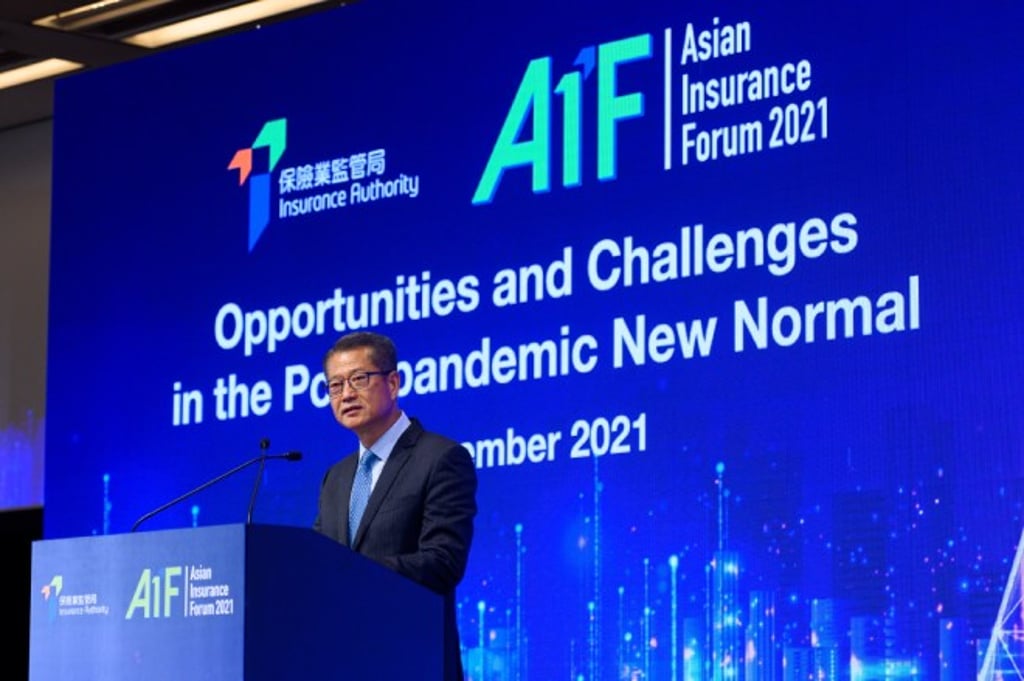
He also updated the audience on the latest policy initiatives that support the industry, such as a streamlined regime for the authorisation and regulation of special purpose insurers in March and the inaugural issuance of a catastrophe bond in October this year. The Government is also working to enhance the tax environment for insurers and broker companies underwriting marine and specialty risks.
Shaping fintech up for the new normal
Following Chan’s speech was a panel discussion moderated by Stephen Yiu, Non-Executive Director of the IA. Panelists included Angel Ng, CEO of Citi Hong Kong and Macau; Colin Pou, Executive Director (Financial Infrastructure) of the Hong Kong Monetary Authority (HKMA); Chibo Tang, Managing Partner of Gobi Partners; and John Tsang, Senior Advisor to Bowtie.
“At the HKMA, our goal is to maintain financial market stability and promote market development. We play a role to enable, facilitate and encourage financial institutions to innovate and adopt new technologies,” said Colin Pou.
During the same panel discussion, John Tsang said the pandemic had forced consumers to form new habits and patterns, including buying insurance. “The shift provides a perfect environment for virtual insurers which have built a convenient platform for consumers to buy pure health protection products at affordable prices.”
Navigating the post-pandemic regulatory landscape
In the final panel discussion, moderated by Samuel Chan, Non-Executive Director of the IA, and senior executives of the IA including Clement Cheung, CEO; Peter Gregoire, Head of Market Conduct (Acting) and General Counsel; Carol Hui, Executive Director, Long Term Business; and Simon Lam, Executive Director, General Business, discussed the latest regulatory developments impacting the industry and how insurers should prepare for them.
In his concluding remarks, Bernard Chan, Convenor of the Non-Official Members of the Executive Council, said talent shortage, exacerbated by the pandemic limiting people mobility, is one of the pressing issues facing the insurance industry. Therefore, the industry must find ways to attract and retain talent. He added that a growing middle-class population and an increasing awareness of health across the GBA would continue to drive demand for insurance and wealth management products, presenting plentiful opportunities for industry players.
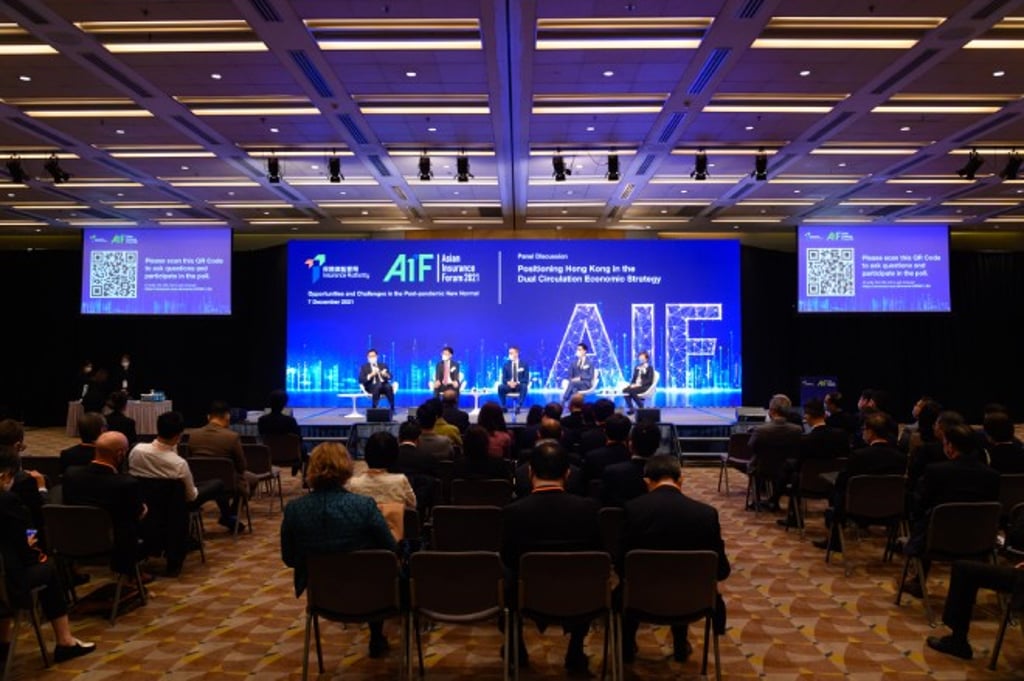
About AIF
The Asian Insurance Forum (AIF), an annual flagship event of the Insurance Authority in Hong Kong, provides a high-level platform for the local and overseas delegates from different segments of the insurance industry to share insights on development prospects and opportunities in the region.